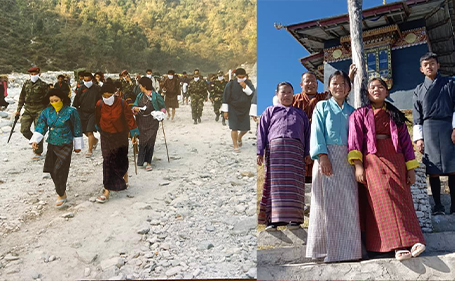Over 20 Years of Rural Transformation

In the year 2001, before Tarayana was established, Her Majesty traveled to Lotokuchu in Samtse, where she saw the entire Lhop communities living in one-room huts built on two-foot-high stilts, made of wood and bamboo, with thatched roofs. Without proper insulation, the occupants were exposed to the harsh elements of nature. Her Majesty spent a few days meeting all the community members, interacting with them, and listening to their needs and challenges.
On the return journey to Samtse, Her Majesty met Sonam Dorji Doya at Sibichang. Sonam had just returned from Thimphu after checking his class X examination results. He was disappointed as he could not get through his high school with the marks obtained.
Her Majesty spent around half an hour talking to him and found that he was the eldest of nine children. As the firstborn, he had
to shoulder the family responsibilities and take care of them, and the marks he obtained did not help in any way to ease his circumstance.
In 2003, Sonam returned to Thimphu looking for a job but could not find one. He wrote Her Majesty a letter and posted it in the post box, wondering if it would find its way to Her majesty. Her Majesty received the letter a few weeks later, and asked the attendants to look for him at the address he had provided. He was
staying with some distant relatives in Dechencholing. Her Majesty asked him to come to the newly established Tarayana Office at the Zomlha complex to see her.
When Her Majesty met him, he was asked what kind of job he was looking for. He responded by saying he just needed a salaried job. Like his fellow villagers, he did not have any aspirations or ambitions in life. He was merely hoping for a training opportunity that would enable him to get a job.
Having been to his village, where no modern amenities existed, and requiring seven hours of trek from Samtse to reach it, Her Majesty felt that perhaps studying Nursing at the Royal Institute of Health Sciences (RIHS) to become a Health Assistant (HA) would not only obtain him a job to help his family but he could also serve the community that was deprived of health services then. Tarayana
sponsored him in pursuing nursing at the RIHS, and in 2005, Sonam completed his training. He got posted in his community at the Sengdhen BHU as the first Health Assistant from the Doya community. He had the opportunity of serving his village for seven long years, contributing immensely to the well-being of his folks in the entire village.
He married Rinzinma Doya from Lotokuchu Jigme in 2005 and has three children, all of whom are studying in schools in Punakha where he resides presently.
After serving in Samtse, he was posted to Zhemang, where he spent two years, after which he has been in Samdingkha, BHU, in Punakha for the past nine years.
One of his brothers, Wangchu Doya, was also supported by Tarayana to study civil engineering in India. He became the first civil engineer from the Doya community and currently works with a private firm in Thimphu.
His parents Sanjakarmo Doya and Namgo Lham Doya, in Lotokuchu Jigme along with all the other families in Lotokuchu were supported with improved housing and socio-economic opportunities through Tarayana’s interventions. They are now enjoying improved living standards with ample economic opportunities. Sonam plans to go back to his village and serve there after his retirement. As a health worker, he feels his skills and knowledge can always be useful and helpful even in his old age, thus fulfilling a core Tarayana aspiration that of continuous
service.
Like Sonam Dorji Doya, Tarayana has transformed the lives of thousands of Bhutanese and hundreds of villages across the country.
